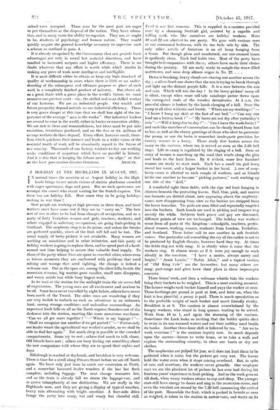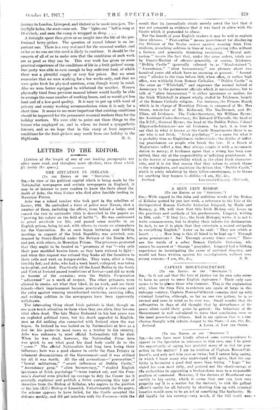A HOLIDAY IN THE HIGHLANDS IN An:usT, 1917. N normal
times the menliou of an August holiday iu the High- t. brings to oar minds visions of station platforms crowded with eager sportionen, dogs and guns. But no such sportsmen am amongst the crowd who stand waiting for the Scotch express. Yet these too are holiday folk. How come they to be going holidays making iu war time ?
Most people are working at high pressure in those days, and tired workers must have some rest if they aro to " carry on." The best sort of rest is often to be had from changes of occupation, and so a party of forty Yorkshire women and girls, teachers, students, and others engaged in sedentary occupations, are going fruit-picking in Scotland. The raspberry crop is in its prime, and unless the berries are gathered quickly, much of the fruit will fall and be lost. The usual supply of berry-pickers is not available. Many women are working on munitions and iu other industries, and thin party of holiday workers is going to replace them, and to spend pad of a hard. earned not time helping to secure this valuable food supply. To those of the party whose lives are spent in crowded cities, where even in leisure moments they are confronted with problems that need solving and wrongs that need righting, the change is indeed a welcome one. Out in the open air, among the silent hills, beside the mountain streams, big worries grow smaller, small ones disappear, and weary• minds rest while busy fingers work.
As we wait at the station for the midnight train the air atoms full of expectation. The young ones are all excitement and anxious to be off. Some have never t ravelled by night before, others have never been north of the Tweed. The older ones are wondering if they are very foolish to embark on such an adventure in an unknown land, among strange conditions and unfamiliar surriamdinge An expectant hush falls on all as the North express thunders out of the darkness into the station, snorting like some monstrous war-horse. "Can we all get seats together ? "—" Where is my luggage 1 "- " Shall we recognize one another if we get parted ? Fortunately our leader wears the agricultural war worker's armlet, so we shall be able to find her again." Not much sleep is possible in the crowded compartments. Some try to rest ; others find much to talk about. Old friends have met ; others are buy finding out something about the now companions with whom they are to spend their niglds and days.
Edinburgh is reached at daybreak, and breakfast is very welcome. There is time for a stroll along Prinues Street before we are off North again. We have only just time to catch our conuexion at Perth, and a somewhat harassed leader wonders if she has her flock complete, including luggage. The next change reassures her, and as the train is already full we storm the luggage-van, and so arrive triumphantly at our destination. We arc really in tho Highlands now, and they are giving a display of typical weather, heavy rain alternating with bright sunshine. A four-mile drive brings the party into camp, wet and weal), but cheerful still. fold is odr first concern. This is supplied in a canteen presided over by a charming Scottish girl, assisted by a capable and willing staff, who like ourselves are holiday workers. Huta 40 and 22 are allotted to our party. We gaze with curious eyes at our communal bedroom, with its ten beds side by side. The only other article of furniture is an oil lamp hanging from a beam. But though plain and unadorned, our one-zoomed house is spotlessly clean. Each bed holds two. Moat of the party have brought bed companions with them; others have made their choice during the journey. Al are early ready to sample the straw-filled mattresses, and soon deep silence reigns in No. 22. . . .
Dawn is breaking, heavy clouds are chasing one another• across the sky ; a silver-lined one :thews that the sun is trying to break through and light up the distant purple hills. It is a race between the mut and rain. Which will win the day ? lu the berry.pickers' camp all le silent, except when some tell-tale raindrops patter down upon the corrugated roofs of the wooden dormitories. At 5 a.m. the peaceful silence is broken by the harsh clanging of a bell. Soon the clamp is all alive with stir and bustle. " Where are my stockings I know I hung my skirt at the foot of our bed."—." Can any one lend me a button-hook "—" My boots are not dry after yesterday's rain "—'• Will it keep tine to-day ?"—" Can I have the wash-basic ?" and such-like snatches of conversation can be clearly heard from hut to hut, as well as the cheery greetings of those who elect to patronize the pump, as one tin basin is somewhat inadequate provision for twenty women in a hurry. Those ready first hasten across the camp to the canteen, where tea is served as soon as the 5.30 bell rings. Life in camp is regulated by the ringing of a bell. Soon an army of women is marching up the road that winds along the glee and leads to the fruit farms. By 6 o'clock some five hundred women are ready to start work. Each has a small tin pail lung round her waist, and a larger bucket in her hand. A row of rasp- berry-canes is allotted to each couple of workers, and so friends invite one another to become " picking partners," each working up one side of the " drill."
A wonderful sight these fields, with the ripe red fruit hanging in clusters beneath the protecting leaves. Red, blue, pink, and mauve sun-bonnets are dotted about, now appearing above the raspberry- canes, now disappearing from view as the berries are stripped from the lover• branches. Tiu pails are soon filled and repeatedly emptied into the buckets. Both hands are used in picking and tongues wag merrily the while. Subjects both grave and gay aro discussed, different points of view are exchanged. The holiday war workers come from all parts of the kingdom—schoolgirls, teachers, profes- sional women, working women, students from London, Yorkshire, and Scotland. These latter call to one another in soft Scottish voices. One particular call resembling the cry of the curlew is not to be produced by English throats, however hard they try. At times the fields ring out with song. It is chiefly when it rains that the • workers sing. It almost seems as if it were joy enough to work silently in the sunshine. " I have a motto, always merry and bright," "Annie Laurie," "Robin Adair," and a topical version of –Old King Cole" are the favourites, but many others are swig; part-songs and glees have their place in these impromptu concerts.
Three hours' work, and then a welcome whistle bids the workers bring their buckets to be weighed. This is a most exciting moment. The farmer weighs each bucket himself and pays the worker at onoo. Three-farthings per pound is paid at first, and later on, when the fruit is less plentiful, a penny is paid. There is much speculation as to the probable weight of each bucket and much friendly rivalry. Breakfast is at 9. The canteen is almost overwhelmed by the hungry workers, who stand in long queues, waiting to be served. Work from 10 to 1, and again the storming of the canteen. Sometimes the Loch looks so inviting that the bolder spirits elect to swim iu its sun-warmed waters and eat their midday meal beside its banks. Another three-hour shift is followed by tea. " Aro we to work overtime 1" is the anxious inquiry now. So much depends upon the answer—leisure to write home, or to take a walk and explore the surrounding country, to clean our• boots or dry our clothes.
The raspberries are pulped for jam, so it does not hurt them to bo gathered when it rains, but the pickers get very wet. The leaves hold the water even when it stops raining overhead. But, in spite of rain and overtime, the workers never grumble. Our employer says we are the pluckiest lot of pickers he has ever had during his fourteen years' experience in fruit-picking. And so the work goes ou till dusk, when weary workers return to sup and sleep. The younger ones still have energy to dance and sing in the recreation-room, and even the weariest are roused by the 7.30 bell announcing the arrival of the post. Meanwhile the fruit, which is packed in barrels as soon as weighed, is taken to the station in motor-vans, and starts on its
journey to London, Liverpool, and Oxford to be made into jam. The daylight fades, the stars come out. The " lights out " ball is rung at 10 o'cloek, and soon the camp is wrapped in sleep. . . .
A fortnight spent thus gives us an insight into the life of the pro- fessional berry-picker. The question of casual labour is an im- portant one. There is a very real need for the seasonal worker, and as far as we can see this need is likely to continue. It should he the concern of all of us to make sure that the conditions of such work are as good as they eau be. This war work has given us some practical experience of the conditions of fife in a fruit-pickers' camp. Our party was able to earn enough to buy Sufficient food, of which there was a plentiful supply at very fair prices. But we must remember that we were working for a few weeks only, and that we were quite fresh for physical exertion, even though weary in mind. Also we were better equipped to withstand the weather. Women physically tired from previous manual labour would hardly be able to average the same number of working hours, and so would got left food and of a less good quality. It is easy to put up with want of privacy and scanty washing accommodation when it is only for a short time. It seems to me more important that existing conditions should be improved for the permanent seasonal workers than for the holiday workers. We were able to point out these things to the farmer who employed us, and in whom we found a sympathetic listener, and to we hope that in this camp at least improved conditions for the fruit-pickers may result from our holiday in the



































 Previous page
Previous page